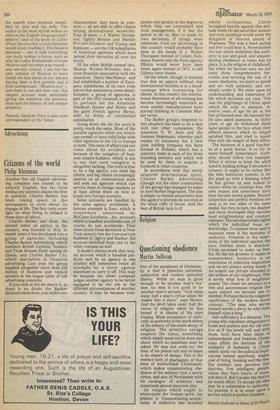Religion
Questioning obedience
Martin Sullivan
One of the paradoxes of Christianity is that it preaches universal subjection and confers universal liberty. While no man is good enough to be another man's master, no man is too good to be another man's servant. "God takes away half a man's virtue when He makes him a slave," says Homer. And the devil takes away half the virtue of religion when he has bound it in chains of his own forging. Blind acceptance of authority as authority is the mark either of the infancy or the senile decay of religion. The primitive savage respects the taboo, something which simply must not be done and about which no questions may be asked. He may not even try the door of his prison cell and so there is no chance of escape. This is the essence both of pharisaism, of that kind of institutional Christianity which makes unquestioning obedience of the military type a moral virtue, and also of Puritanism with its catalogue of arbitrary and sometimes almost innocent sins.
So religion which ought to emancipate the human spirit, imprisons it. Unquestioning accepttance of authority has arrested whole civilisations. Christ inveighed heavily against this attitude when He declared that sinners and even quislings would enter the Kingdom of Heaven ahead of Pharisees. This was a hard saying and few could bear it. Nevertheless the law which enshrines this auth ority is just and good, and unquestioning obedience at times has its place. It is the religion of childhood, but when we become men we put away these comprehensive res traints and' severing the ties of a lower obedience, we learn to speak and act with authority and not simply under it. We enter upon an understanding and experience of life which becomes our own. This was the pilgrimage of Christ upon which He calls to embark. At twelve years of age He sat at the feet of learned men. He listened but He also asked questions. At thirty years of age he withstood these same people to the face when they offered answers which no longer satisfied Him, and tried to quash Him with the weight of their office.
The business of a good teacher, as of a good doctor, is to try to make himself unnecessary. Auth ority should follow this example. When it strives to keep the adult mind in leading strings it becomes a tyranny. It ought to be rather like the wise instructor content to let the pupil go with a blessing when he has grown up and indeed to rejoice when he outstrips him. His own reason and conscience have then become sound guides. Mutual subjection and perfect freedom are seen to be two sides of the same medal, but they in turn, the sharper and more developed they become need enlightenment and constant restraint. The race has certain rights which the individual must ac knowledge. To express them and to maintain them is the business of authority. Freedom is the asser tions of the individual against the race. Neither claim is absolute. Christ promised to make us free, but He did not promise to make us independent. Authority is an expression of collective inspiration and we are always acting wisely if we submit our private interests to the welfare of our neighbours. This is surely what love of neighbour means. The closer we advance to a free and autonomous religion the more subject we become one to another. Perhaps this is the religious significance of the modern social contract. "The man who serves himself serves a slave; he who rules himself rules a king." Self-sufficiency is a delusion. The young who repudiate obligations to home and parents and the old who live as if the world will end with them, both have false ideas of
independence and freedom. Christ tians affirm the doctrine of the solidarity of humanity in Chnst which spells out the political implications behind apartheid, wages, cost of living, housing and the rest. The intellect may perceive this
doctrine. Few intelligent people, unless they have hearts of stone,
will deny it. But it is also the motive for moral effort. To accept the idea may be a submission to authority. To practise it is to enter upon a service which is perfect freedom.
Martin Sullivan is Dean of St Paul's


































 Previous page
Previous page